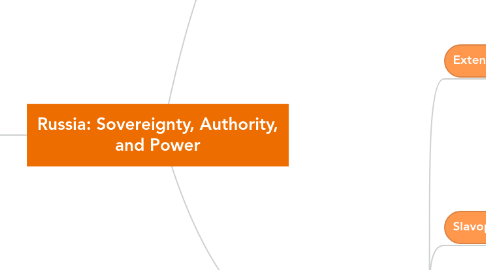
1. My Geistesblitzes
1.1. just testing
2. Political Culture
2.1. Geographic Setting
2.1.1. Largest country in the world
2.1.2. Vast array of political cultures
2.2. Eastern Orthodoxy
2.2.1. Russia did not share in the values associated with the Enlightenment, Reformation, or Scientific Revolution
2.2.2. Remained a statism-based society, as opposed to a civil society.
2.3. Equality of Result
2.3.1. Long history of egalitarianism
2.4. Skepticism about Power
2.4.1. Putin has had high approval ratings, but government as a whole has not.
2.5. Importance of Nationality
2.5.1. Discrimination based on long-held stereotypes
2.5.2. History of anti-semitism
3. History
3.1. Extensive cultural heterogeneity
3.1.1. Wide range of cultural diversity
3.1.2. Borders in constant state of change
3.1.3. "Russian Federation"
3.2. Slavophile v. Westernizer
3.2.1. Slavophile = "lover of Slavs"
3.2.1.1. Pride in Slavic customs
3.2.1.2. Resists outside influence
3.2.2. Westernizer
3.2.2.1. Tsar Peter the Great
3.2.2.1.1. Used 'western' model to modernize Russia
3.2.2.1.2. Constructed St. Petersburg as a "window on the West"
3.2.2.2. Catherine the Great
3.2.2.2.1. Built Russia's empire
3.3. Revolutions of the 20th Century
3.3.1. Communist Revolution
3.3.1.1. Tsar rule ended when Lenin and the Bolsheviks seized power
3.3.1.2. Old social classes swept away
3.3.1.3. Blended western technology and invention with Slavophile-based nationalism
3.3.2. Second Revolution
3.3.2.1. 1991 - Dissolution of the Soviet Union
3.4. Absolute, centralized rule
3.4.1. Tsars ruled with force, in part because of geography.
3.4.2. Communism characterized by centralized power.
